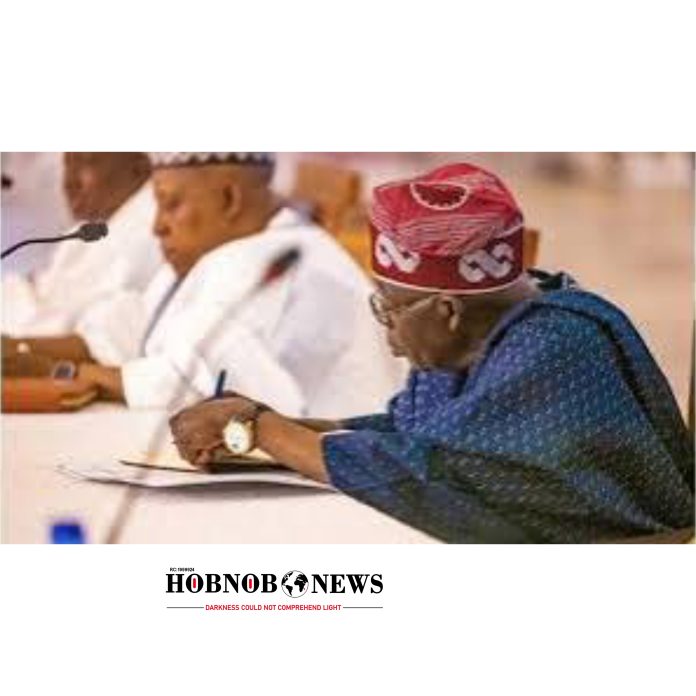In a recent development, President Bola Tinubu has proposed an increase in Nigeria’s 2025 budget from the initial N49.7 trillion to N54.2 trillion.
This adjustment is attributed to additional revenues generated by key government agencies, including N1.4 trillion from the Federal Inland Revenue Service (FIRS), N1.2 trillion from the Nigeria Customs Service, and N1.8 trillion from other government-owned agencies.
In his budget presentation to the National Assembly, President Tinubu emphasized the administration’s strategic priorities, particularly in implementing the Renewed Hope Agenda.
The proposed allocations reflect a commitment to addressing critical sectors essential for the nation’s growth and development.
The budget outlines projected revenues of N34.82 trillion and government expenditures totaling N47.90 trillion, including N15.81 trillion allocated for debt servicing. This results in a budget deficit of N13.08 trillion, or 3.89% of the estimated GDP.
The budget prioritizes key sectors as follows:
Defence and Security: N4.91 trillion
Infrastructure: N4.06 trillion
Education: N3.52 trillion
Health: N2.48 trillion
These allocations underscore the administration’s focus on strengthening national security, enhancing infrastructure, and investing in human capital development. The budget also projects a decline in inflation from the current rate of 34.6% to 15% in the coming year, with an anticipated improvement in the exchange rate from approximately 1,700 naira per US dollar to 1,500 naira. Additionally, a base crude oil production assumption of 2.06 million barrels per day is projected.
Following the budget presentation, Senate President Godswill Akpabio referred the proposal to the Senate Committee on Appropriations for swift consideration, assuring that the budget would be reviewed and passed before the end of February.
This proposed budget reflects the administration’s renewed commitment to strengthening the foundation of a robust economy while addressing critical sectors essential for the nation’s growth and development.
The initial 2025 budget proposal was presented in late 2024, outlining a total expenditure of N47.9 trillion. This figure represented a significant increase from previous years, aiming to address various economic challenges and set the nation on a path toward sustainable development. The initial proposal included substantial allocations for debt servicing, capital projects, and recurrent expenditures. However, following a review of additional revenues generated by key government agencies, the budget was revised to N54.2 trillion to accommodate the increased revenue and further invest in critical sectors.
The Nigerian Institute of Social and Economic Research (NISER) has analyzed the proposed 2025 budget, emphasizing the need for effective fiscal-monetary coordination, improved revenue mobilization, and structural reforms to tackle inflation, exchange rate volatility, and social inequalities. Achieving the ambitious revenue target of ₦36.35 trillion, managing debt servicing, and stabilizing the naira will be key to fostering sustainable growth, boosting investment, and meeting the projected GDP growth of 4.6%.
The BudgIT Foundation has also provided insights into the 2025 budget framework, highlighting that out of the N49.74 trillion proposed, N16.33 trillion will be used for debt service, N14.85 trillion for capital projects, N14.12 trillion for recurrent non-debt expenditure, and N4.44 trillion for statutory transfers.
Economists have noted that, despite the record high in naira terms, the 2025 budget is the lowest since 2018 in dollar terms. This is attributed to the devaluation of the naira, which has reduced the budget’s value when converted to U.S. dollars. Using the prevailing exchange rate of $1/N1,679, the proposed budget of N47.9 trillion translates to $27.96 billion, a 17.76% drop from the 2024 budget of $34 billion at constant dollar prices.
In summary, the 2025 budget reflects the Nigerian government’s efforts to address economic challenges through increased spending in critical sectors, revenue mobilization, and structural reforms. The proposed allocations and projected economic indicators underscore the administration’s commitment to fostering sustainable growth and development.

